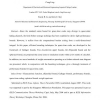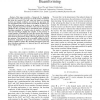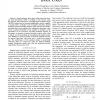123
click to vote
CORR
2010
Springer
14 years 10 months ago
2010
Springer
Perfect Space-Time Codes are optimal codes in their original construction for Multiple Input Multiple Output (MIMO) systems. Based on cyclic division algebras, they are full-rate,...
TIT
2008
15 years 1 months ago
2008
Since the standard union bound for space-time codes may diverge in quasi-static fading channels, the limit-before-average technique has been exploited to derive tight performance b...
126
click to vote
CORR
2007
Springer
15 years 2 months ago
2007
Springer
—The differential encoding/decoding setup introduced by Kiran et al, Oggier-Hassibi and Jing-Jafarkhani for wireless relay networks that use codebooks consisting of unitary matri...
CORR
2007
Springer
15 years 2 months ago
2007
Springer
Designs for transmit alphabet constrained space-time codes naturally lead to questions about the design of rank distance codes. Recently, diversity embedded multi-level space-time...
106
click to vote
CORR
2007
Springer
15 years 2 months ago
2007
Springer
— ”Extended Clifford algebras” are introduced as a means to obtain low ML decoding complexity space-time block codes. Using left regular matrix representations of two speci�...
143
click to vote
ICASSP
2010
IEEE
15 years 2 months ago
2010
IEEE
—This paper provides a framework for designing space-time codes to take advantage of a small number of feedback bits from the receiver. The new codes are based on circulant matri...
103
click to vote
ICC
2007
IEEE
15 years 8 months ago
2007
IEEE
Abstract— Despite primary space-time coding where the channel state information (CSI) is available at the receiver only, the capacity and performance of multiple-input multiple-o...
107
click to vote
DCC
2006
IEEE
16 years 1 months ago
2006
IEEE
In this paper we demonstrate a new and original way to apply the representation theory of finite groups to the development of space-time codes for use in multiple antenna wireless ...



